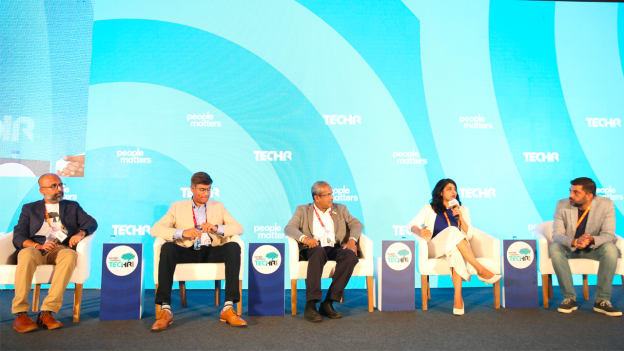People: The core of tech transformation

“When you are getting technology embedded into your organization, there are often some challenges that come up. Two of the biggest challenges that we see in technology adoption within organizations are that we don't think enough about culture and we don’t think enough about the leadership conflicts that may arise,” said Rishi Mehra, Staffing Lead GBO India, Google during a Power Panel discussion at People Matters TechHR 2019.
Sharing their thoughts on the challenges organizations face as they undergo transformation, industry experts agreed that despite there being lots of data, it is of no help unless it actually works towards improving the culture. Joining Mehra in this thought-provoking session were Deepti Varma, Head HR -Amazon India, Middle East and North Africa; Parameswaran Venkataraman, Chief Design Officer, Fractal Analytics; Prasad Rajappan, Founder & MD, ZingHR; and Varun Bhatia, Chief People & Culture Officer, AirAsia Berhad. The panel discussion brings forth insightful and practical advice on what organizations and people within organizations need to do to make tech transformation and innovation more meaningful, with the right leadership and cultural setup.
Getting the fundamentals right
There is a need to build a leadership that helps people to think about that evolution on a daily basis and that needs a mindset. Having an open, transparent and collaborative culture supported by leadership which is open to experimentation is the starting point of putting technology in place.
Sharing AirAsia’s thought process on the relationship between leadership, culture and technology, Varun Bhatia, Chief People and Culture Officer, said, “We are a people company operating an airline, that’s how we see ourselves from a cultural perspective which is key, because if you understand your business model and you understand how people fit into your business model, that's the starting point.”
Bhatia goes on to share that once you have clarity on the business model and people fitment, then you can with confidence turn to your leadership and tell them why culture is important, why the building of people, their morale and engagement is important. He also spoke about the importance of humanizing technology.
“If you make technology a big thing then it becomes a barrier and people become fearful. If your chatbot is designed to address what the user is looking for instead of asking them to do something, it makes them feel safe, secure and valued in the company,” said Bhatia.
As organizations advance their system and processes, the focus tends to be on the adoption of technology, and employee experience gets neglected. The very fabric of transformation must be built on strong cultural fundamentals to ensure smooth and effective adoption.
As shared by Deepti Verma, “If the culture and leadership of an organization don't find a particular technology easy and intuitive to use and apply, that kind of technology is useless.” She further added that Amazon follows three principles while building a new technology:
- Working backward from customers, in this case, employees are the customers
- It needs to be simple
- It should be intuitive
These key ingredients, according to Verma, form the essence of technology.
Speaking of his experience with leaders when it came to implementation of any new technology, Parameswaran Venkataraman, Chief Design Officer at Fractal Analytics said, “There is too much emphasis on management. The focus needs to shift to employees. Before you figure out what technology to launch, the first thing is to figure out how do you frame the problem from not just the management's perspective but also the employee's perspective."
"What is it that they need on the ground to enable themselves to be more productive, more efficient and to be empowered?" said Parameswaran Venkataraman.
Enabling tech transformation
The bar has been set very low when it comes to technology for employees. “Technology needs to be delightful--if it’s not delightful it will not be used,” said Venkataraman. Speaking of how to get to a delightful product he said that organizations need to focus a lot on emotional needs. He further added that there is a lot of focus on functional benefits, but not enough on emotional benefits. “How does an employee feel about the feature that's being introduced into the product, that's more important than thinking that the feature would help him save time. If employees feel that they are being monitored every day, that will be his biggest fear and the biggest barrier for him to use the product even if you have the best technology whether AI, Blockchain, ML or any other technology,” added Venkataraman.
It is true that the focus of organizations tends to be more on the functional benefits of technology, discounting the value-add to employees in their careers.
“The biggest problem we are facing is people are seeing technology as a purpose and not the means. Before rushing into decision-making organizations should know if they are digitally ready and is their culture digitally mature enough to make change happen,” said Prasad Rajappan, Founder & MD, ZingHR. With the digital wave riding in, every organization no matter how old or new, big or small, is today facing a challenge in aligning their people with the rapid pace of digital transformation.
Digital transformation at its very core is a change, a transition. To enable an organization to successfully sail through this change, the right leadership and culture are key for driving the transition keeping the following factors in mind:
- Driven top-down by defining what problem are you trying to solve with technology
- Work backward from the customer, treating employees as your customers
- See whether the organization is culturally ready to embrace the technology
- And then implement the right technology for the right purpose















